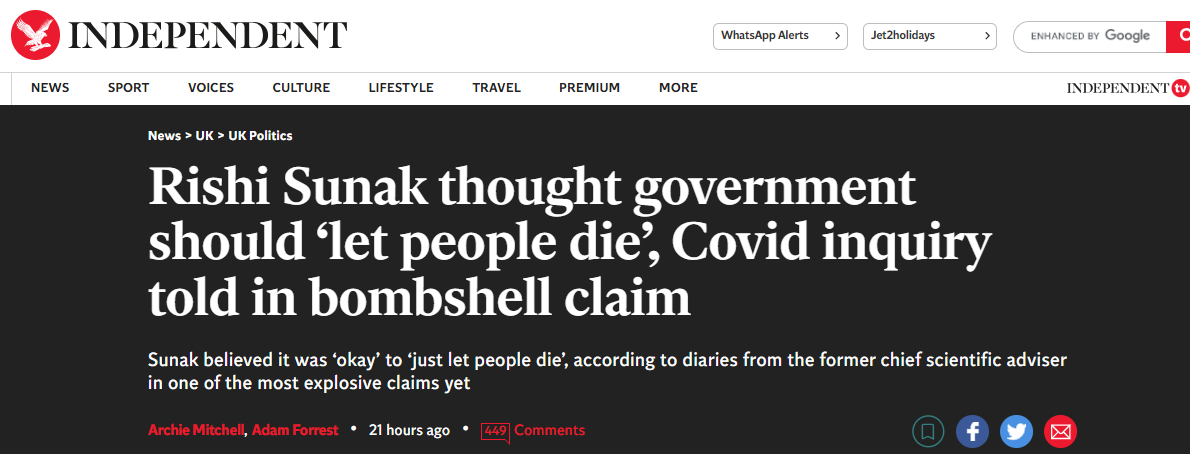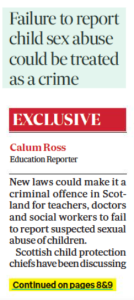Amendments to the Policing and Crime Bill 2025 that would make the Mandatory Reporting chapter an effective piece of legislation
At present the government’s “mandatory reporting” section of the bill is designed NOT to help abused children. These are some amendments which would convert it into an effective piece of legislation
Amendment
Replace Section 45(1) with the following text
- A person aged 18 or over must make a notification under this section if, in the course of engaging in a relevant activity in England or Wales, they
- know or suspect, or
- have reasonable grounds for knowing or suspecting,
that a child sex offence may have been committed (at any time).
Delete Section 47
Reason: For the duty to report to apply to suspicions and all reasonable grounds for suspicion that a child sex abuse offence has been committed, using wording similar to that which exists for instance in Section 330 of the Proceeds of Crime Act 2002 relating to the mandatory duty on certain persons to report suspected money laundering.
For the duty to apply to Wales as well as England.
A court, when deciding whether a person has reasonable grounds for knowing or suspecting child sex abuse, can take into account any published statutory guidance on the subject, documents such as “Working Together to Safeguard Children” and “Keeping Children Safe in Education”.
Amendment
Delete Section 45(5)
Amend Section 45(2)(c) to it reads as follows
(c) must be made as soon as practicable (subject to subsection (6));
Reason: Statutory guidance already recommends that a report is made as soon as practicable, and does not allow for a delay as described in Section 45(5), particularly in circumstances where there is a risk to the life or safety of a relevant child. Specifically, Keeping Children Safe in Education (2025). Page 93, para 366 states:
The initial response to an allegation.
Where the school or college identifies that a child has been harmed, that there may be an immediate risk of harm to a child or if the situation is an emergency, they should contact local authority children’s social care and as appropriate the police immediately as per the processes explained in Part one of this guidance.
There is no justification for making a statutory provision for a delay in such emergency circumstances.
Amendment
Insert the following subsections into Section 45.
(9a) A person commits an offence if they fail to fulfil the duty under subsection (1).
(9b) A person who commits an offence under this subsection (9a) is liable on summary conviction to a fine not exceeding level 5 of the standard scale.
Delete Section 54(2)
Reason: To introduce a criminal sanction for failure to fulfil the duty to report child sexual abuse, as recommended in Recommendation 13 of the IICSA final report, replacing the provision to require a DBS referral in certain circumstances.
Amendment
Insert the following subsections into Section 45.
(9c) A person who causes or threatens to cause any detriment to a person placed under the duty to report pursuant to subsection (1), or to another person, either wholly or partly related to the mandated person’s actual or intended provision of a report under this Act, is guilty of an offence.
(9d) Detriment includes any personal, social, economic, professional, or other detriment to the person.
(9e) A person guilty of an offence under Subsection (9c) is liable on summary conviction to a level 4 fine on the standard scale.
Reason: To protect mandated reporters from retaliation, by introducing a criminal offence of threatening or causing any detriment to a mandated reporter related to the act of reporting.
Amendment
In Section 52, delete subsections (2) and (3)
Reason: Beyond the “initial 7-day period” described in section 45(11), there is no justification for anybody attempting to persuade a person to delay making a report under section 45.
Amendment
In Section 45, add subsection (1a) as follows)
(1a) The duty under subsection (1) only applies if
- the person has regular unsupervised contact with one or more children, or
- the person acts in a supervisory or leadership capacity over other persons who have regular unsupervised contact with one or more children.
Reason: To ensure that persons within the leadership or an organisation providing relevant activities are covered by the duty to report, and to ensure that persons within an organisation which engages in relevant activities but themselves do not supervise children (e.g. cleaning or catering staff) are not subject to the duty.
Amendment (only to be considered if the amendments to insert Sections 45(1b), (9a) and (9b) are passed, will be withdrawn otherwise)
Delete Section 52
Reason: If the duty to report, backed by a criminal sanction, applies equally to the leadership of organisations providing relevant activities as well as to those directly caring for children, there is no need for the separate offence of preventing or deterring a report.
Amendment
Add Subsection 49 (3) (c) as follows
(c) the age difference among all the persons involved, from the youngest to the oldest, is no more than two years.
Reason: The difference in maturity between a child who has just reached the age of 13 and one who is almost 18 is very great, and there is a serious reason to be concerned about the degree of consent given by the younger child in such circumstances. Therefore it is appropriate to limit the age difference for this exemption to the reporting duty.
Amendment
Amend Section 50 (1) (b) (i) to read
(i) A is a child aged 13 or over, and
Reason: To ensure that the exemption from reporting certain disclosures by children applies only to disclosures by children aged 13 or over.



